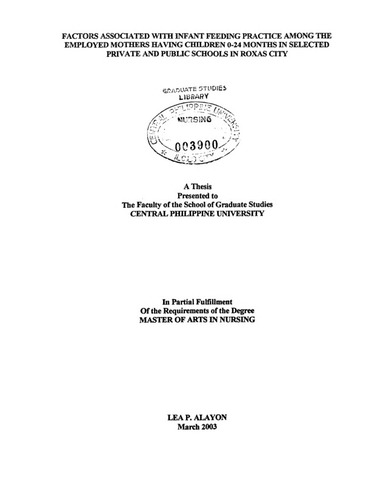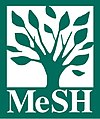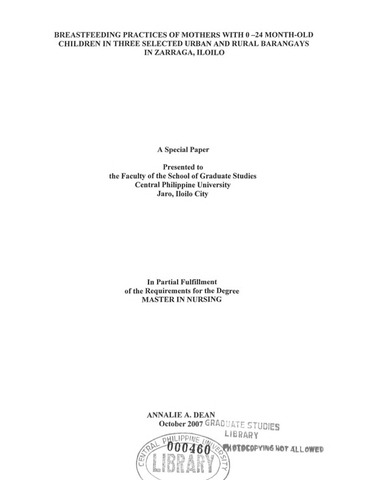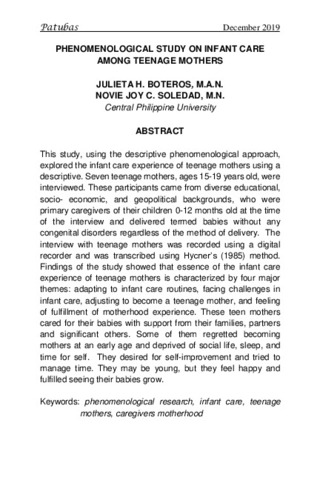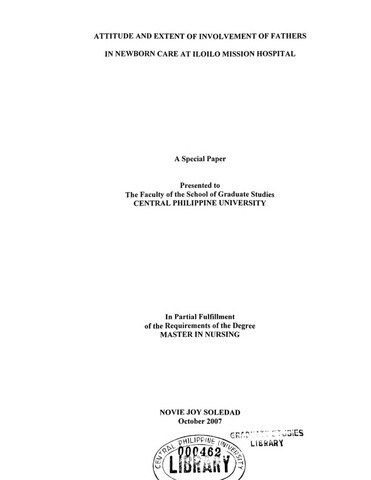Factors associated with infant feeding practice among the employed mothers having children 0-24 months in selected private and public schools in Roxas City
摘要
The main objective of this study was to determine the factors associated with the infant feeding practice among the employed mothers in selected private and public schools in Roxas City. It attempted to find out whether personal characteristics of the mothers, namely: age, educational attainment, monthly income, number of children ever bom and work status are associated with their feeding practice.
It is likewise determined whether health related characteristics of the mothers, namely: place of delivery, health services availed, obtained information from mass media on infant feeding, and support received, are associated to their infant feeding practice.
This study employed one-shot survey using a self-administered questionnaire. The study sample consisted of 40 mothers from four selected private and public schools in Roxas City namely: Capiz National High School, Capiz Institute of Technology, Colegio Dela Purisima Concepcion and Filamer Christian College. Frequency distribution, percentage, means and Cramer’s V were used as statistical tools.
The studies revealed that majority of mothers were in their middle age years (26- 35 years) with an average monthly income of 13,398.00. Mostly of the respondents are highly educated and occupying a teaching job.
Majority of the respondents had their deliveries in the hospitals and availed some of the health services for pregnant women. In terms of obtained information from mass media on infant feeding, majority of the respondents had watched television and read newspaper. Almost all mothers claimed that they had received emotional support from their husbands and families.
A greater proportion of mothers studied had used mixed feeding regimen, followed by bottle-feeding and there were few who breastfed their babies.
Association analysis revealed that infant feeding practice significantly vary when respondents/mothers are classified according to age, educational attainment, income, number of children born and work status.
The infant feeding practices, on the other hand, are not significantly related to the following health related characteristics, such as place of delivery, health services availed, mass media exposure on information about infant feeding and support received.
The researcher recommends to GOs, NGOs and proper government agencies especially the Department of Health to further strengthen the Mother and Baby Friendly Initiative particularly on Rooming-In and Breastfeeding policies among public and private hospitals.
Conclusions
Age, educational attainment, income, number of children is significantly associated with infant feeding practices. The older the mother, they tend to mix feed their babies.
The higher the educational attainment of the mothers, the more likely that they practice mixed feeding.
The higher the income, the greater their tendency to bottle-feed and mixed feed.
The more children the women had delivered the greater their tendency to practice breastfeeding alternately with bottle-feeding.
Place of delivery, health services availed, obtained information from mass media on infant feeding and support are not significantly associated with infant feeding practice. This means that place of delivery, health services availed, obtained information from mass media on infant feeding and support received have nothing to do with their infant feeding practice.
Recommendations
1. The Mother and Baby Friendly Hospital Initiative should be evaluated and monitored.Strength and weaknesses of the program should be reassessed to further improve the program to increase compliance.
2. The Department of Health should assess the implementation of Breastfeeding Policy in accredited hospitals. To increase the number of are accredited Mother and Baby Friendly Hospitals the DOH should give priority to this program.
The Task Force on Breastfeeding should closely monitor implementation of the project.
3. Nurse educators, NGOs and GOs should reach out to mother who have high- income, well-educated and encourage them to breastfeed.
4. Administrators, health educators and local government units concerned should further strengthen their information, education, communication and motivation drive on breastfeeding to increase compliance and utilization of breastfeeding. Mother’s classes should be conducted not only for the under privileged, but also to those who are educated, wealthy and well-informed individuals.
5. The researcher recommends for further researches related to breastfeeding the following:
a. A study on the internal motives and physiological factors influencing breastfeeding.
b. An Evaluation of Mother and Baby Friendly Hospital Initiative.
c. The Role of the Husbands and their Participation on Breastfeeding Decision.
d. The Effects of Breastfeeding to the Mother, Baby and the whole Family.
描述
Abstract only
建议引文
Alayon, L. P. (2003). Factors associated with infant feeding practice among the employed mothers having children 0-24 months in selected private and public schools in Roxas City (Unpublished Master’s thesis). Central Philippine University, Jaro, Iloilo City.
文件类型
Thesis主题
关键字
部
School of Graduate Studies学位
Master of Arts in Nursing货架位置
GSL 610.73072 Al12
物理描述
xi, 81 leaves
集合
相關項目
顯示由標題,作者,創造者和主題相關的項目。
-
Breastfeeding practices of mothers with 0-24 month-old children in three selected urban and rural barangays in Zarraga, Iloilo
Dean, Annalie A. (2007)Summary This study was designed to determine the feeding practices of mothers with 0-24 month old children and whether knowledge about breastfeeding and attitude towards breastfeeding is related to their feeding ... -
Phenomenological study on infant care among teenage mothers
Boteros, Julieta H.; Soledad, Novie Joy C. (Central Philippine University, 2019-12)This study, using the descriptive phenomenological approach, explored the infant care experience of teenage mothers. Seven teenage mothers, ages 15-19 years old, were interviewed. These participants came from diverse ... -
Attitude and extent of involvement of fathers in newborn care at Iloilo Mission Hospital
Soledad, Novie Joy (2007)This study aimed to determine respondents’ attitude towards newborn care and their involvement in newborn care activities. Specifically, the objectives of the study sought to determine the characteristics of respondents ...


